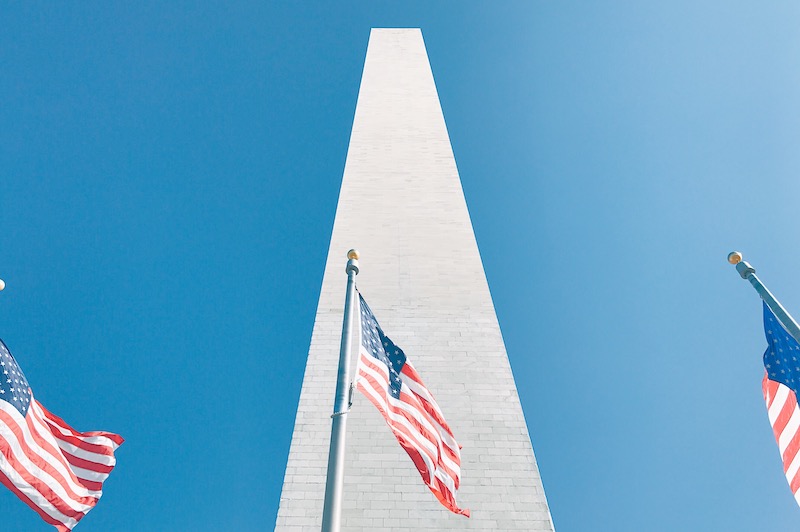I’ll admit it: I am a Whole Foods groupie. Most days, I’d turn down a pricey restaurant meal for a turn through the flavor- and Pantone-feast represented in the Whole Foods salad bar—purple beets, bright orange roasted squash and emerald greens that have never undergone the dulling trial of a long journey in a refrigerated truck. The unparalleled assortment kombucha, coconut water, and other semi-mysterious elixirs only deepen my conviction that Whole Foods is the choicest gathering ground for good things to eat and drink.
So when I heard that John Mackey, the founder of Whole Foods, was coming to speak at the Cato Institute in Washington, D.C., I claimed my spot in the audience with the zeal of a true believer. Having read Wesley Gant’s post reviewing Mackey’s new book, “Conscious Capitalism: Liberating the Heroic Spirit of Business,” I arrived with my appetite whetted for Mackey’s first-hand take on how his intellectual and practical knowledge have turned into a “treatise for a cultural revolution.”
Mackey on Politics and Business
 In his speech, Mackey traced his “empowered” and “decentralized” business model to theories of human action derived from Friedrich Hayek, Ludwig von Mises, Milton Friedman and the like. While he doesn’t expect (or necessarily explicitly express) his political philosophy in the course of his “day job,” he does view Whole Foods as a micro-expression of the power of capitalism to improve standards of living and enable human flourishing—a perspective that reminds me of Michael Novak’s classic work, “The Spirit of Democratic Capitalism.”
But according to Mackey, libertarian political philosophy is not the key contributor to his success. The linchpin is instead “managing with love instead of fear.”
The Whole Foods emphasis in this area is plain to see. Last week I stopped by Whole Foods to take note in-store messages. In the produce aisle, I found: “We are family! Supporting local vendors and farmers since 1980!” Above the dairy cases, I saw the business’s core values (all 13!) on display: quality, delight, happiness, prosperity, environment, partnership, education, thorough, pure, passion, wholesome, organic, healthy. The common thread unifying these words mirrors Mackey’s primary values. Or to read between the lines, in short, “we care for our people.”
The Making of the “Big Business” Bad Guy
Yet for all the talk of love, care and rainbows, we’re still talking about a business, not a fairy tale. Our culture casts business like Whole Foods in a villainous role, styled as greedy, corrupt and elitist—think Enron. The public sins of a few are quickly bestowed onto many an honest enterprise. In today’s America, the business community has a reputation problem: people don’t trust the private sector.
The deeper issue, explained Mackey, stems from secularization, specifically our gradual abandonment of Judeo-Christian roots. Where business was once associated with honest, hardworking people whose personal integrity translated through their transactions, the Industrial Revolution ushered in a materialist paradigm:
In his speech, Mackey traced his “empowered” and “decentralized” business model to theories of human action derived from Friedrich Hayek, Ludwig von Mises, Milton Friedman and the like. While he doesn’t expect (or necessarily explicitly express) his political philosophy in the course of his “day job,” he does view Whole Foods as a micro-expression of the power of capitalism to improve standards of living and enable human flourishing—a perspective that reminds me of Michael Novak’s classic work, “The Spirit of Democratic Capitalism.”
But according to Mackey, libertarian political philosophy is not the key contributor to his success. The linchpin is instead “managing with love instead of fear.”
The Whole Foods emphasis in this area is plain to see. Last week I stopped by Whole Foods to take note in-store messages. In the produce aisle, I found: “We are family! Supporting local vendors and farmers since 1980!” Above the dairy cases, I saw the business’s core values (all 13!) on display: quality, delight, happiness, prosperity, environment, partnership, education, thorough, pure, passion, wholesome, organic, healthy. The common thread unifying these words mirrors Mackey’s primary values. Or to read between the lines, in short, “we care for our people.”
The Making of the “Big Business” Bad Guy
Yet for all the talk of love, care and rainbows, we’re still talking about a business, not a fairy tale. Our culture casts business like Whole Foods in a villainous role, styled as greedy, corrupt and elitist—think Enron. The public sins of a few are quickly bestowed onto many an honest enterprise. In today’s America, the business community has a reputation problem: people don’t trust the private sector.
The deeper issue, explained Mackey, stems from secularization, specifically our gradual abandonment of Judeo-Christian roots. Where business was once associated with honest, hardworking people whose personal integrity translated through their transactions, the Industrial Revolution ushered in a materialist paradigm:
 In his speech, Mackey traced his “empowered” and “decentralized” business model to theories of human action derived from Friedrich Hayek, Ludwig von Mises, Milton Friedman and the like. While he doesn’t expect (or necessarily explicitly express) his political philosophy in the course of his “day job,” he does view Whole Foods as a micro-expression of the power of capitalism to improve standards of living and enable human flourishing—a perspective that reminds me of Michael Novak’s classic work, “The Spirit of Democratic Capitalism.”
But according to Mackey, libertarian political philosophy is not the key contributor to his success. The linchpin is instead “managing with love instead of fear.”
The Whole Foods emphasis in this area is plain to see. Last week I stopped by Whole Foods to take note in-store messages. In the produce aisle, I found: “We are family! Supporting local vendors and farmers since 1980!” Above the dairy cases, I saw the business’s core values (all 13!) on display: quality, delight, happiness, prosperity, environment, partnership, education, thorough, pure, passion, wholesome, organic, healthy. The common thread unifying these words mirrors Mackey’s primary values. Or to read between the lines, in short, “we care for our people.”
The Making of the “Big Business” Bad Guy
Yet for all the talk of love, care and rainbows, we’re still talking about a business, not a fairy tale. Our culture casts business like Whole Foods in a villainous role, styled as greedy, corrupt and elitist—think Enron. The public sins of a few are quickly bestowed onto many an honest enterprise. In today’s America, the business community has a reputation problem: people don’t trust the private sector.
The deeper issue, explained Mackey, stems from secularization, specifically our gradual abandonment of Judeo-Christian roots. Where business was once associated with honest, hardworking people whose personal integrity translated through their transactions, the Industrial Revolution ushered in a materialist paradigm:
In his speech, Mackey traced his “empowered” and “decentralized” business model to theories of human action derived from Friedrich Hayek, Ludwig von Mises, Milton Friedman and the like. While he doesn’t expect (or necessarily explicitly express) his political philosophy in the course of his “day job,” he does view Whole Foods as a micro-expression of the power of capitalism to improve standards of living and enable human flourishing—a perspective that reminds me of Michael Novak’s classic work, “The Spirit of Democratic Capitalism.”
But according to Mackey, libertarian political philosophy is not the key contributor to his success. The linchpin is instead “managing with love instead of fear.”
The Whole Foods emphasis in this area is plain to see. Last week I stopped by Whole Foods to take note in-store messages. In the produce aisle, I found: “We are family! Supporting local vendors and farmers since 1980!” Above the dairy cases, I saw the business’s core values (all 13!) on display: quality, delight, happiness, prosperity, environment, partnership, education, thorough, pure, passion, wholesome, organic, healthy. The common thread unifying these words mirrors Mackey’s primary values. Or to read between the lines, in short, “we care for our people.”
The Making of the “Big Business” Bad Guy
Yet for all the talk of love, care and rainbows, we’re still talking about a business, not a fairy tale. Our culture casts business like Whole Foods in a villainous role, styled as greedy, corrupt and elitist—think Enron. The public sins of a few are quickly bestowed onto many an honest enterprise. In today’s America, the business community has a reputation problem: people don’t trust the private sector.
The deeper issue, explained Mackey, stems from secularization, specifically our gradual abandonment of Judeo-Christian roots. Where business was once associated with honest, hardworking people whose personal integrity translated through their transactions, the Industrial Revolution ushered in a materialist paradigm:
Classical economists became enchanted with the efficiency and the productivity of the industrial enterprises that they studied. Industrial and machine metaphors became the primary metaphors used to explain how the world really worked since this reflected the Newtonian scientific worldview that came to dominate the consciousness of the age. Every business was seen as a type of machine with various inputs and profits being the output.In an industrialized and now tech-mediated world, it’s easy to forget that sound morality is neither a hindrance nor an optional accessory to a thriving business class. With focus shifting from people to machines and integrity to automation, ethical compromise became easier—more diffused and less obviously connected to personal character. After all, the onus of the Enron scandal doesn’t rest on one set of shoulders. And is culpable for the mortgage bubble mess? The resulting ebb of upstanding behavior has landed the “big business” in America’s pillory. New Ethics? So how can business regain its reputation and footing? Instead of returning to the Judeo-Christian foundations, Mackey argues that we “need new ethical foundations,” fashioned according to his “Conscious Capitalist” framework. His idea is to send “great modern businesses” businesses out to save the world. He writes:
… More transcendent purposes have unique expressions at each business they also can be grouped into certain well known and timeless categories. Philosophy credits with expressing the timeless ideals of “The Good”, “The True”, and “The Beautiful” that humanity has sought to create, discover, and express for thousands of years. If we add the ideal of “The Heroic” to the above three we have the framework of higher ideals that most great businesses seek to express in some form or fashion.Forget honest business people going humbly about their work. What we have now is the “good, true, and beautiful” triangle stretched into an awkward rhombus by a call for heroism through “the powerful promethean desire to really change things … to achieve what others say is impossible.” Anybody else hear faint echoes of the Ubermensch? Don’t Play Hero Let me cut to the chase: I vote we nix the hero complex. I love Whole Foods as a grocery store, but not as true north on my moral compass. I’d just as soon turn to my dog for an interpretation of “The Theory of Moral Sentiments”as look to my grocer, banker, or any other business as a hero or moral sage. Can business contribute to flourishing? Absolutely. Can capitalism create sound ethical foundations or play savior? Not according to the story of one self-sacrificing Hero who offers ultimate satisfaction to the hungry and hope to the hopeless. No offense to Whole Foods or any exemplary business, but the hero role has already been cast—and fulfilled. But for the record, I still plan to pick up tonight’s dinner makings at Whole Foods.



